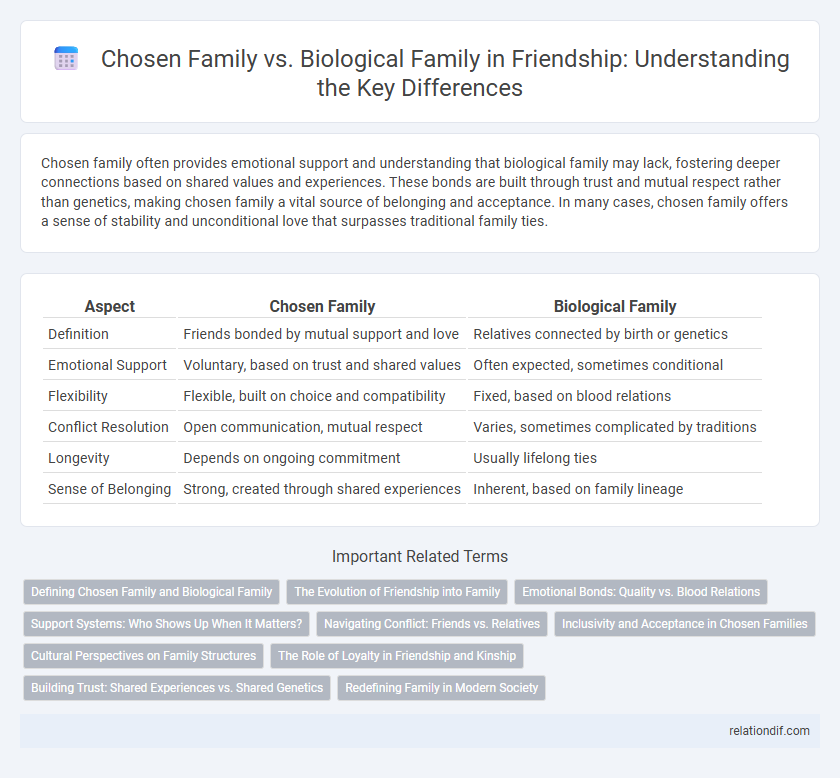Chosen family often provides emotional support and understanding that biological family may lack, fostering deeper connections based on shared values and experiences. These bonds are built through trust and mutual respect rather than genetics, making chosen family a vital source of belonging and acceptance. In many cases, chosen family offers a sense of stability and unconditional love that surpasses traditional family ties.
Table of Comparison
| Aspect | Chosen Family | Biological Family |
|---|---|---|
| Definition | Friends bonded by mutual support and love | Relatives connected by birth or genetics |
| Emotional Support | Voluntary, based on trust and shared values | Often expected, sometimes conditional |
| Flexibility | Flexible, built on choice and compatibility | Fixed, based on blood relations |
| Conflict Resolution | Open communication, mutual respect | Varies, sometimes complicated by traditions |
| Longevity | Depends on ongoing commitment | Usually lifelong ties |
| Sense of Belonging | Strong, created through shared experiences | Inherent, based on family lineage |
Defining Chosen Family and Biological Family
Chosen family consists of close friends and loved ones who provide emotional support and a sense of belonging, often replacing or supplementing biological relatives. Biological family is defined by genetic relationships and kinship ties, typically including parents, siblings, and extended relatives connected by birth or marriage. While biological family is rooted in ancestry, chosen family is defined by intentional bonds and shared experiences.
The Evolution of Friendship into Family
Friendship has evolved beyond traditional boundaries, often forming chosen families that provide emotional support and a sense of belonging comparable to biological families. Chosen families, particularly prominent in LGBTQ+ communities, offer resilience and acceptance that biological ties may lack due to societal or personal challenges. This evolution highlights the shifting understanding of familial bonds, emphasizing intentional connection and mutual care over genetic ties.
Emotional Bonds: Quality vs. Blood Relations
Emotional bonds in chosen families often surpass those in biological families, emphasizing quality of connection over genetic ties. Chosen families provide support, understanding, and acceptance tailored to individual needs, fostering deep, meaningful relationships. These intentional bonds create a sense of belonging that can be more emotionally fulfilling than traditional family structures based solely on blood relations.
Support Systems: Who Shows Up When It Matters?
Support systems in chosen families often surpass biological ties by providing consistent emotional presence and reliability during critical moments. Friends selected for shared values and understanding demonstrate unwavering commitment, offering tailored support that biological families may lack due to complex dynamics or distance. This intentional network fosters resilience, proving that who shows up when it matters is defined by loyalty and empathy rather than genetics.
Navigating Conflict: Friends vs. Relatives
Navigating conflict within chosen family often involves direct communication and mutual understanding, as friendships are built on voluntary bonds and shared values. In contrast, conflicts with biological relatives may require balancing deep-rooted family dynamics and unspoken expectations that have developed over years. Prioritizing empathy and setting clear boundaries can help maintain harmony in both relationships, but the autonomy in chosen family allows for more flexible conflict resolution strategies.
Inclusivity and Acceptance in Chosen Families
Chosen families often provide a greater sense of inclusivity and acceptance compared to biological families, embracing diverse identities and life choices without judgment. These bonds are built on mutual support and understanding, creating safe spaces where individuals feel valued for their authentic selves. Research shows that chosen families enhance emotional well-being, particularly for LGBTQ+ individuals and others marginalized by traditional family structures.
Cultural Perspectives on Family Structures
Cultural perspectives on family structures reveal diverse definitions of chosen family versus biological family, where many societies prioritize blood relations as the primary unit of support, while others embrace chosen families formed through deep emotional bonds and mutual care. In LGBTQ+ communities and some indigenous cultures, chosen families often serve as crucial support networks that transcend traditional kinship, reflecting values of inclusion and identity affirmation. Research in cultural anthropology highlights how these varying family models impact social cohesion, mental health outcomes, and community resilience across different populations.
The Role of Loyalty in Friendship and Kinship
Loyalty in chosen families often surpasses biological ties by fostering unwavering support and trust based on mutual understanding and shared experiences. Unlike kinship bound by blood, friendships founded on loyalty emphasize emotional commitment and intentional care, creating resilient bonds that withstand challenges. This dynamic highlights how loyalty serves as the cornerstone for both chosen and biological families, shaping the strength and quality of their relationships.
Building Trust: Shared Experiences vs. Shared Genetics
Building trust in chosen families stems from shared experiences that foster mutual understanding and emotional support, contrasting with biological families where trust often relies on shared genetics and inherited bonds. The relational depth in chosen families is cultivated through intentional interactions, vulnerability, and consistent reliability, creating a sense of security independent of DNA connections. Research highlights that the quality and frequency of positive interactions contribute more significantly to trust formation than mere genetic ties.
Redefining Family in Modern Society
Chosen family, consisting of close friends and community members, increasingly serves as a vital support network, especially for individuals marginalized by biological family dynamics. Modern society recognizes these bonds as equally significant, offering emotional stability, acceptance, and shared values that biological ties may lack. This shift redefines traditional family structures, emphasizing intentional relationships built on trust and mutual care over genetic connections.
chosen family vs biological family Infographic

 relationdif.com
relationdif.com